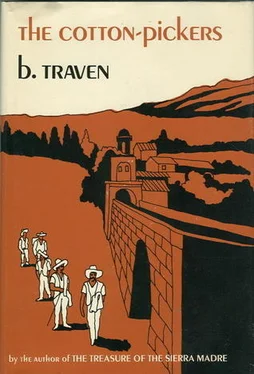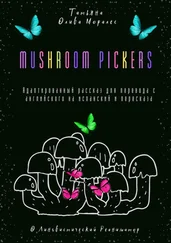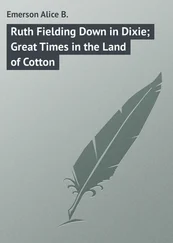B. Traven - The Cotton-Pickers
Здесь есть возможность читать онлайн «B. Traven - The Cotton-Pickers» весь текст электронной книги совершенно бесплатно (целиком полную версию без сокращений). В некоторых случаях можно слушать аудио, скачать через торрент в формате fb2 и присутствует краткое содержание. Год выпуска: 1969, Издательство: Hill and Wang, Жанр: Проза, на английском языке. Описание произведения, (предисловие) а так же отзывы посетителей доступны на портале библиотеки ЛибКат.
- Название:The Cotton-Pickers
- Автор:
- Издательство:Hill and Wang
- Жанр:
- Год:1969
- ISBN:нет данных
- Рейтинг книги:3 / 5. Голосов: 1
-
Избранное:Добавить в избранное
- Отзывы:
-
Ваша оценка:
- 60
- 1
- 2
- 3
- 4
- 5
The Cotton-Pickers: краткое содержание, описание и аннотация
Предлагаем к чтению аннотацию, описание, краткое содержание или предисловие (зависит от того, что написал сам автор книги «The Cotton-Pickers»). Если вы не нашли необходимую информацию о книге — напишите в комментариях, мы постараемся отыскать её.
—Book World
The Cotton-Pickers — читать онлайн бесплатно полную книгу (весь текст) целиком
Ниже представлен текст книги, разбитый по страницам. Система сохранения места последней прочитанной страницы, позволяет с удобством читать онлайн бесплатно книгу «The Cotton-Pickers», без необходимости каждый раз заново искать на чём Вы остановились. Поставьте закладку, и сможете в любой момент перейти на страницу, на которой закончили чтение.
Интервал:
Закладка:
Laid about with dawn’s shimmering gold, the end was in sight!
Our troubles were over. In that town over there, bathed in golden sunlight, joy awaited us. I left the herd on the prairie, ordered camp pitched, galloped into town and wired Mr. Pratt. It was evening when I got back to camp, where the fires were blazing and the two vaqueros on guard watch were riding leisurely about singing the animals to sleep.
To man, who has always been a diurnal creature, there is something indescribably uncanny about the tropic night; and tropic nights are also uncanny to diurnal animals. In the evenings, small herds gather round the rancho house to be near man, knowing that man is their protector. During the weeks after the rainy season when mosquitoes and horseflies zoom through the air, thick as swirling dust, the cattle come home from the prairies to congregate around the rancho house, expecting help. But you can’t help them because you’ve wrapped your own face and hands in cloth to protect yourself against the evil spirits of the tropical hell.
Even great herds on their home ranches get restless at sundown. They surround the huts of the vaqueros, and the watches ride around them, singing, throughout the night, and the animals lie down to sleep. Some of the big breeders leave it to the vaqueros to sing or not, for some think it’s unnecessary. But cattle not sung to sleep are restless the whole night through, lying down for ten minutes, then getting up to prowl around and rub against the others for companionship. The cattle are then sleepy next day, and feed less than cattle sung to sleep, and hence take longer to fatten into shape. During transports, singing is even more essential, for cattle are even more restless, having to lie as they do on strange earth.
So I had my men sing every night, and they did it willingly. As the men rode slowly around them, singing, the cattle would lie down with a feeling of absolute security; drowsily the cattle would follow the singing rider with their eyes, moo and low, sigh gigantically, and settle to sleep. The more singing through the night, the better, for the cattle felt reassured that nothing could happen to them, as man was near to shield them from all dangers, including jaguars and mountain lions. I might add that my own kind of cowboy singing would keep away anyone who adored music. My own singing, for instance, was regarded as the eighth wonder of the world, but not as music.
A front watch was no longer necessary, as the river guarded us, and the flanks needed only the two regular watches. I took the foreman from the front, so we could all spend the last evenings together. Later, while the men smoked and chatted around the big fire, I saddled up and rode watch along the herd, singing, whistling, humming, calling to the cattle.
Clear as only the tropic night can be, the blue-black sky arched over the singing prairie along the river. The glittering stars studded the velvet night with gold. Dozens of falling stars streaked the heavens, as if winging from the high lonely dome in search of love or to give love, so unobtainable in those lonely heights where no bridge spans the void from one star to the other.
On the grassy flats, only glowworms and fireflies were visible. But invisible life sang with a million voices and made music like that of violin, flute, and harp — and tiny cymbal, and bell.
There lay my herd! One dark, rounded form next to the other. Lowing, breathing, exhaling a full, warm, heavy fragrance of natural well-being, so rich in its quiet earthiness, such balm to the spirit, bringing with it such utter contentment.
My army! My proud army which I’d led over river and mountain, which I’d protected and guarded, which I’d fed and watered, whose quarrels I’d settled and whose ills I’d cured, which I’d sung to sleep night after night, for which I’d grieved and worried, for whose safety I’d trembled, and whose care had robbed me of sleep, for which I’d wept when one was lost, which I’d loved and loved, yes, loved as if it had been of my own flesh and blood!
Oh, you who took armies of warriors over the Alps to carry murder and pillage into lands of peace, what do you know of the joy, the perfect joy, of leading an army!
The next morning the salt transport came out. I’d given them salt only once during the whole march; for it’s not wise to risk salting unless you’ve plenty of water for them the same day, and the next. Now, however, they took salt and drank water to their fill, so they took on such a magnificent plump appearance, like soldiers with new uniforms. Their hides, well-rubbed, gleamed as if lacquered. Yes, I was proud of my transported herd.
In a few days, Mr. Pratt arrived with his cattle agent.
“Damn it all, man,” the agent kept saying, “that’s some cattle. They’ll sell like hotcakes in cold season.”
Mr. Pratt kept shaking my hand. “Boy oh boy, how did you do it? I didn’t expect you until the end of next week. I’ve already sold four hundred head. There’s another breeder on the way, and if you’d have been late, the price would have been lower, for this market can’t take two thousand head in one week. Come on, I’ll drive you into town. The foreman can manage the herd now.”
In town, we settled accounts, and I had hundreds of pesos in hand. Still, he stood me to a real dinner.
“If I get a good price,” said Mr. Pratt, “I’ll give you another hundred pesos as an extra bonus. You’ve earned it. You got off lightly with those damned bandits.”
“I must tell you, honestly,” I admitted, “one of the bandits I knew personally, a certain Antonio. Once I picked cotton with him. He saw to it that I got off lightly.”
“That’s just the point. You must have good luck — everywhere, whether you breed cattle, drive them, or take a wife.” He burst out laughing. “Tell me, boy, what did you do to my wife?”
“Me? To your wife?” The food stuck in my mouth, and I thought I turned pale. Women! They can act so irresponsibly! They get all sorts of notions into their heads; out of the blue, they may get a confession jag. Could she possibly have spilled the beans? She didn’t seem the type.
“When your wire arrived, she really raved. ‘There you are! See what a wash-out you are! A dead loss. But that boy gets the herd over, as if he was carrying it in a hamper slung on his pommel. Just like you couldn’t ever do. This fellow’s got something, the f—ing son-of-a-bitch!”
“For goodness’ sake, Mr. Pratt, you’re not thinking of divorce?”
“Divorce? Me? Whatever for? Because of a trifle like that?”
He gave me an odd smile. If only I knew what it meant. “No. Why should I get a divorce? Are you afraid I might?”
“Yes,” I confessed.
“But why?”
“Because your wife said she’d marry me.”
“Oh. Yes, I remember her saying that, and if she says she’s going to do a thing, she does it. But why are you squirming like that? Scared? Don’t you like my wife? I thought that—”
I didn’t let him finish that one. “I like your wife very much,” I confessed rapidly. “But — please don’t get a divorce! If I did marry her, it wouldn’t be a bad thing, perhaps, but I really don’t know what I’d do with a wife, I beg your pardon, what I should do with your wife.”
“What you’d do with any woman! Give her what she likes.”
“That’s not the point. It’s something else. I don’t know how I’d get on as a married man.” I tried hard to make it clear to him. “Understand, I’m only a vagabond. I’m incapable of
staying put on my rear. I couldn’t drag my wife along on my travels; nor could I stay put, and sit at a proper table with a proper breakfast and a proper dinner every day. No! My stomach wouldn’t stand it, either. Now, if you’d like to do me a favor—”
Читать дальшеИнтервал:
Закладка:
Похожие книги на «The Cotton-Pickers»
Представляем Вашему вниманию похожие книги на «The Cotton-Pickers» списком для выбора. Мы отобрали схожую по названию и смыслу литературу в надежде предоставить читателям больше вариантов отыскать новые, интересные, ещё непрочитанные произведения.
Обсуждение, отзывы о книге «The Cotton-Pickers» и просто собственные мнения читателей. Оставьте ваши комментарии, напишите, что Вы думаете о произведении, его смысле или главных героях. Укажите что конкретно понравилось, а что нет, и почему Вы так считаете.











